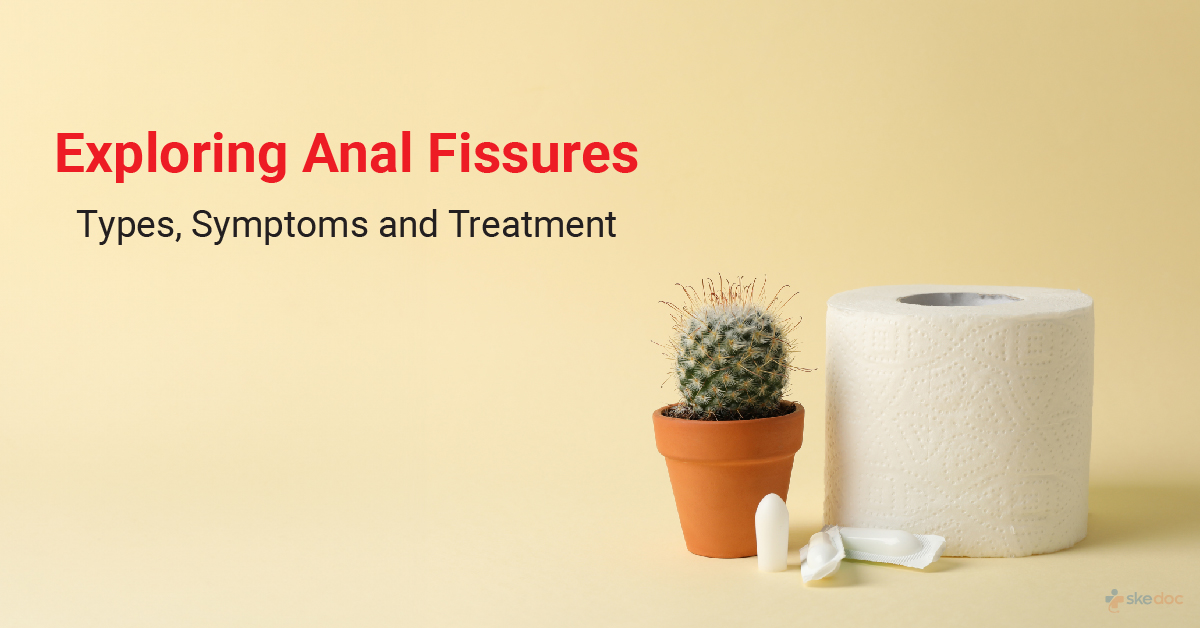Allergy
Blood Diseases
Bone & Joints
Brain
Cancer
Child Care
Cosmetic Surgery
Diabetes
Endocrinology
ENT
Eye
Gen Medicine
General Surgery
Heart
Kidney
Lifestyle
Liver & Digestive
Lung
Men’s Health
Mental health
Physiotherapy
Rheumatology
Skin and hair
Sleep Disorders
Spine
Transplant
Women Health
Thyroid
Vascular Surgery
Anal Fissure

What is an Anal Fissure?
An Anal Fissure is defined as a small tear or cut in the skin around the anal canal. It causes pain and bleeding with bowel movements. The depth of the fissure can be either superficial or deep and extends to the underlying sphincter muscle.
Alternate names
- Fissure-in-ano
- Rectal fissure
Is anal fissure a medical emergency?
An anal fissure is not a medical emergency.
Types
Anal fissures can be acute and chronic
- Acute Anal Fissure: An acute fissure appears as a fresh tear and heals within 4 to 8 weeks of conservative medical management.
- Chronic Anal Fissure: A chronic fissure presents with raised edges and fails to heal with conservative management. It extends to the surrounding muscle and can result in a sentinel pile or an anal fistula.
Anal fissures are of two types:
- Primary fissures: Primary fissures are caused due to straining of bowel movements, defecating hard stools, prolonged diarrhea during vaginal delivery, and anal intercourse. They are located in the posterior or anterior position.
- Secondary fissures: Secondary fissures are caused as a result of previous anal surgery or due to inflammatory bowel disease, granulomatous diseases, infections, or malignancies. They are located in a lateral position and appear as multiple fissures.
Causes
Rectal fissures are very common in infants and can occur at any age. They can be caused due to several reasons, which include:
- Stretching of the anus for passing large or hard stools
- Constipation and straining during a bowel movement
- During childbirth in women
- Prolonged diarrhea
- Anal intercourse
- Crohn's disease
- Hemorrhoids
- Rectal ulcer
- Anal cancer
- Ulcerative colitis
- HIV
- Tuberculosis
- Inflammatory bowel disease
Risk factors
Factors that influence the development of fissures are:
- Constipation: Hard straining of bowel movement may result in tearing of the skin around the anus and causing an anal fissure.
- Childbirth: Anal Fissures are most likely to occur during vaginal delivery.
- Anal intercourse: Sexually transmitted infections can break down the tissue around the anus resulting in an anal fissure.
- Crohn's disease: Chronic inflammation of the intestinal tract leading to the anal canal can eventually result in tearing.
- Age: Anal fissures occur more in children due to poor toileting.
Signs & symptoms
Signs and symptoms include:
- Pain during and after a bowel movement
- Bright red blood in the stool or on the toilet paper
- Visible cut or tear around the anus
- Tiny skin tag or lump near the Anal Fissure
Investigations
Investigations of an anal fissure include a physical examination of the anal region. Other procedures and investigations include:
- Anoscopy
- Endoscopy
- Biopsy
- Imaging tests:
- CT scan
- MRI
- Endoanal ultrasound
Diagnosis
A diagnosis of an anal fissure is established based on medical history, clinical evaluation, and results of the investigations done.
Treatment
Anal Fissures heal on their own within 4 to 8 weeks. Most primary fissures can be treated with simple methods like warm sitz baths, topical ointments, increased fluid intake, high-fiber diet, and stool softeners. Multidisciplinary management is required in cases of cancers that are present along with fissures.
Medical treatment
If symptoms persist, the following medical treatments are recommended:
- Topical nitroglycerin is to increase blood flow to the fissure and promote healing
- Injection of botulinum toxin is to relax the anal sphincter
- Topical anesthetic creams to relieve pain
- Calcium channel blockers are to relax the anal sphincter
Interventional treatment including surgery and indications for surgery/ Surgical treatment
If there is a failure of conservative management, surgical procedures are required for the treatment of anal fissures. These mostly include lateral internal sphincterotomy(LIS). A small portion of the anal sphincter muscle is cut and removed to reduce pain, relax the muscle, and promote the healing process.
Role of diet/exercise/ Lifestyle changes/ Preventive measures
Diet modifications and lifestyle changes can prevent Anal Fissures and can avoid their recurrence. Some of them include the following:
- Eating a well-balanced diet with high-fibre content
- Drinking an adequate amount of fluids
- Avoiding straining during bowel movements
- Keeping the anal area clean and dry
- Exercises to reduce constipation
- Frequent diaper changes in babies
Complications
Complications of Anal Fissures include:
- Constipation: Avoiding a bowel movement because of extreme pain from an Anal Fissure can lead to constipation
- Failure to heal: Anal Fissures that fail to heal can become chronic and can develop into a sentinel pile
- Recurrence: The probability of Anal Fissure recurrence is high
- Tear extending to the surrounding muscles: Chronic anal fissures can extend to the surrounding muscles and lead to anal fistula formation.
Prognosis
The overall prognosis of a rectal fissure is good. Mild to moderate fissures can be treated with conservative management, and severe cases can be treated with surgical treatment.
When to contact the doctor? / How to identify the complications?
It is always advisable to consult a physician after noticing:
- Pain and burning during a bowel movement
- Fresh blood in stools or on toilet paper
Indications for hospitalization if required
Acute anal fissures resolve with medical treatments. Chronic anal fissures that fail to resolve with conservative management cause persistent pain and rectal bleeding, and those that result in sentinel pile formation, etc. Require surgical treatment and hospitalization.
Suggested clinical specialists/ Departments to consult for this condition
- Colon and rectal surgery
- Gastroenterology
Was this article helpful?
YesNo
Comments





